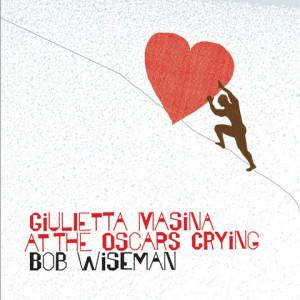Artist: Bob Wiseman
Album: Giulietta Masina at the Oscars Crying
Bob Wiseman first got my attention in 1993, in the wake of Prince legally changing his name (Prince Rogers Nelson) to a squiggle: Wiseman sent out press releases announcing that henceforth he, Bob Wiseman, would be known as Prince. Former  Prince’s lawyers were extremely aggressive in shutting him down, but I was charmed by Wiseman’s nerve, and picked up his compilation album In By Of. I found it full of quirky, minimalist, lo-fi arrangement ideas and odd-yet-earnest lyrics, and kept the album around. I also found his high, reedy voice incredibly tuneless and incompetent, so I virtually never *listened* to it. But when I read an extremely enthusiastic PopMatters review of his 2013 album Giulietta Masina at the Oscars Crying, I figured “Hey, maybe he’s learned to sing in the last two decades; what the heck”. He had indeed — his voice is still reedy and a bit imprecise, but tunefully gliding and expressive — while he’s also strengthened his arranging skills and lyric-writing, which were his strengths to begin with. And now I’m ready to be enthusiastic about him in my own right, for you.
Prince’s lawyers were extremely aggressive in shutting him down, but I was charmed by Wiseman’s nerve, and picked up his compilation album In By Of. I found it full of quirky, minimalist, lo-fi arrangement ideas and odd-yet-earnest lyrics, and kept the album around. I also found his high, reedy voice incredibly tuneless and incompetent, so I virtually never *listened* to it. But when I read an extremely enthusiastic PopMatters review of his 2013 album Giulietta Masina at the Oscars Crying, I figured “Hey, maybe he’s learned to sing in the last two decades; what the heck”. He had indeed — his voice is still reedy and a bit imprecise, but tunefully gliding and expressive — while he’s also strengthened his arranging skills and lyric-writing, which were his strengths to begin with. And now I’m ready to be enthusiastic about him in my own right, for you.
All of the song titles form the structure “(person/thing) at (setting)”: these are songs as portraiture. The barbershop quartet-like title track (with exotic violin-and-chanting-and-soldier-drums break) salutes and sadly outlines the life of Federico Fellini’s actress wife: “Crying for her man and the recognition, no pension plans … played the part of a prostitute/ who would not lose her heart, let men lie and loot … 1 baby dead, 3 gravesites, 2 artists wed… 8 and 1/2”. Neil Young at the Junos, expansive and piano-driven like Elton John’s Goodbye Yellow Brick Road era, honors Young’s annual benefits for the Bridge School (for severely handicapped children), his willingness to pick political fights, and, why not?, his model train collection, even while being about the texture of a life where “People want their pictures taken with you, secretly afraid their hairstyle will be wrong” and “You lay down your head in some overpriced fancy hotel bed”. Mothface@yahoo.com, a jaunty yet awkward Broadway tune on brass and drums, is for a deceased performance-artist/ actress ex-girlfriend, but centers on how much he liked a speech at her funeral by someone he’d never expected to empathize with about anything.
Many of the portraits on Giulietta Masina at the Oscars Crying also double as fierce critiques of the world they occur in. Robert Dziekanski at the Vancouver Airport, driven by percussive piano, tells us the too-easily-forgotten newspaper story of a Polish immigrant murdered by police in a Canadian airport: “People tried to tell them I didn’t speak English/ People tried to tell them I wasn’t stoned/ People tried to tell them I was unarmed and alone./ Took them almost five seconds to decide in their expert opinion to fire./They found themselves not guilty … surprise!” Ruby Bates at Grad School is about the Scottsboro Boys case — nine black boys jailed for decades on false charges of rape — but focuses, with respect, on one of their two accusers, the  one who later recanted her charges and devoted much of her life to civil rights in general and to unsuccessfully trying to free the people she’d doomed. Aristide at the Press Conference summarizes 200 years of Haiti’s history and honors its would-be president: “Democratically inspected, three times re-elected … the puppet turned around and faced the puppeteer:/ ‘You owe me lost wages, am I being clear?’ … Now shocked and afraid, the French and USA, and even their Canadian friends. He’s removed from power, it’s kidnapping hour, because he said ‘This extortion must end'”. It’s not the tale as the New York Times told it — I know this because at the time I would read their foreign policy coverage and assume its general accuracy — and it’s also not particularly subtle. But on its side it has warped and energetic acoustic blues guitar, rousing female backup singers (part gospel, part blues, part playground), sneaky electric solos, and righteousness. I like Bob Wiseman‘s weapons.
one who later recanted her charges and devoted much of her life to civil rights in general and to unsuccessfully trying to free the people she’d doomed. Aristide at the Press Conference summarizes 200 years of Haiti’s history and honors its would-be president: “Democratically inspected, three times re-elected … the puppet turned around and faced the puppeteer:/ ‘You owe me lost wages, am I being clear?’ … Now shocked and afraid, the French and USA, and even their Canadian friends. He’s removed from power, it’s kidnapping hour, because he said ‘This extortion must end'”. It’s not the tale as the New York Times told it — I know this because at the time I would read their foreign policy coverage and assume its general accuracy — and it’s also not particularly subtle. But on its side it has warped and energetic acoustic blues guitar, rousing female backup singers (part gospel, part blues, part playground), sneaky electric solos, and righteousness. I like Bob Wiseman‘s weapons.
The music on Giulietta Masina is striking for how weirdly hard-to-describe it is, when it’s built from mainstream elements. The ultra-danceable Reform Party at Burning Man has funk, circa-1970 Rolling Stones, jazz piano, James Brown, and Lovely Rita Meter Maid all influencing it somewhere. Lobbyists at Parliament, just as danceable, has Motown, Bo Diddly, exceptionally busy percussion, and a strange little drift that leads into a treble organ solo. Ruby Bates at Grad School is piano ballad and ghostly march, with a distinctive little violin piece, slide guitar, and female torch singing in the background. Portrait of Phil at Various Times in the Closet has the elements of 1970s The Band/ Eagles/ Warren Zevon/ Fleetwood Mac mainstream pop, but it shambles and wobbles and lurches and chants, and builds something memorable and softly dramatic.
It all supports a set of lyrics determined to look at, and learn from, as much of his hemisphere as he can. The villains in Bob Wiseman‘s songs are the people (the many, many people) who use power to shut down protests, arrest inconveniently-elected officials, or just torment anyone who’s too different. He fights them using, not just stories, but variety, the tunes of every low culture he can find. Makes sense to me.
– Brian Block
To see the rest of our favorites, visit our Favorite Albums of 2013 page!
Technical note: we include an Amazon link for Wiseman’s most recent album *prior* to Giulietta Masina because it’s good too, and we make a tiny but helpful bit of money when you buy albums through our links. That said, to buy the album under review, which might seem more directly on-point, go to his bandcamp page .
